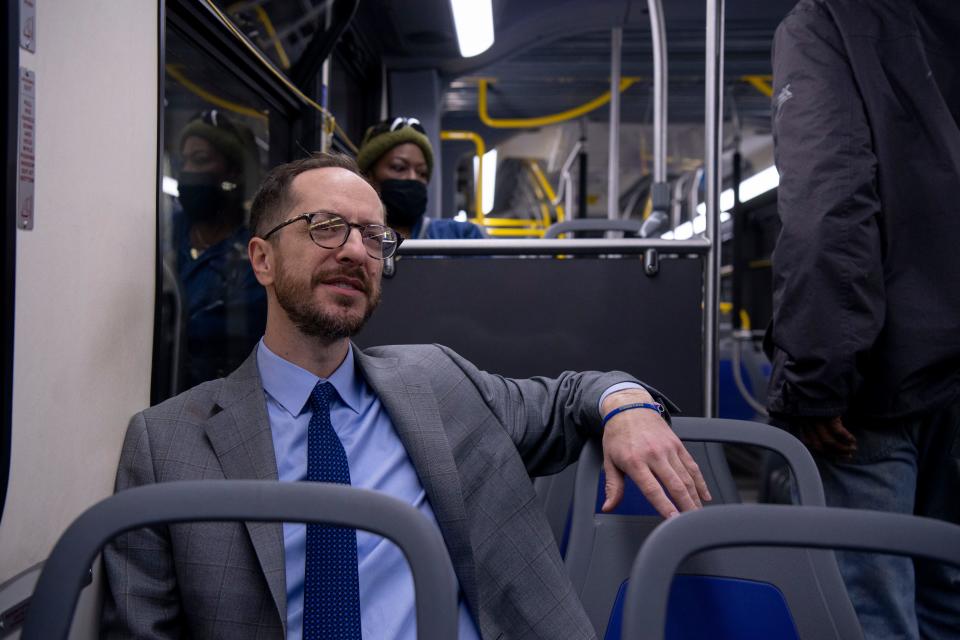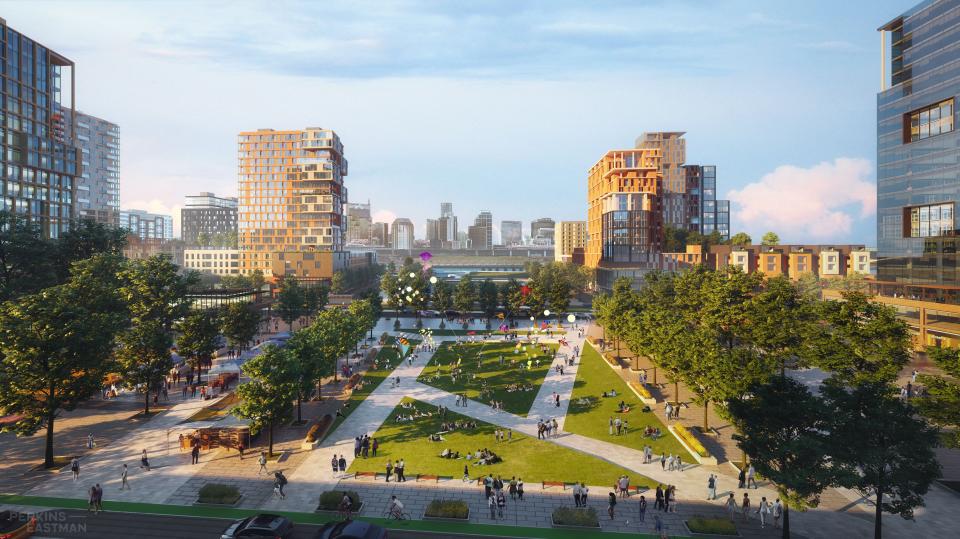Vanderbilt Poll: Nashville transit referendum, Mayor Freddie O'Connell see majority support
An "overwhelming" 84% of respondents in Vanderbilt University's latest Nashville poll support moving forward with a citywide transit funding vote in November.
The poll's results show support for the transit referendum across political parties: 92% support from Democrats, 86% from independents and 70% from Republicans.
The poll, released Thursday, surveyed 1,014 people from Nashville between March 1 and March 21. Nearly half of commuters who responded to the poll said they spend between 30 to 90 minutes in traffic every day (20% reported longer than 90 minutes).

Nashville Mayor Freddie O'Connell's administration plans to release a final transit improvement plan — and the proposed tax raise to pay for it — later this month. If all goes to plan, Davidson County voters will see the referendum on their ballots Nov. 5.
In 2018, Vanderbilt's poll of Nashville residents found more than 70% agreed the transit plan on the ballot that year was "essential" or "very important" to Nashville's future. While 42% of registered voters surveyed roughly eight weeks before the 2018 referendum supported former Mayor Megan Barry's transit proposal, that didn't translate at the ballot box. The effort failed 64% to 36%.
A rosy outlook on O'Connell, Nashville's future
O'Connell also fared well, securing an overall approval rating of 71%.
High approval ratings aren't uncommon early in a mayoral term. Former Mayor John Cooper saw an 80% approval rating in spring 2020, the highest since the Vanderbilt Poll-Nashville first launched in 2015.
Results also showed a rosier outlook on Nashville's future, with 53% of respondents saying the city is on the right track — a 9% increase from 2023. But respondents still expressed concerns over Nashville's rapid growth, with 80% agreeing that the city has "grown too quickly" and 47% of respondents reporting that their daily lives are worse thanks to the city's growth.
A summary of the poll results links O'Connell's high popularity marks to the rise in residents believing Nashville is headed the right direction.
"While you could argue that he still is in a bit of a honeymoon phase, the mayor's overall approval defies the polarization that we see blocking a lot of action in current national politics," Vanderbilt Political Science Professor and Poll Co-director John Geer said in a statement. That support should boost O'Connell's ability to accomplish governance goals and maintain public support, Geer said.
58% report little to no East Bank knowledge
But residents' lack of knowledge about the East Bank, the city's most expansive project this term, could prove a challenge for the administration. More than half of the poll's respondents said they knew very little (26%) or nothing (32%) about the project, which will ultimately span the redevelopment of more than 100 acres of Metro-owned land, a new Titans stadium and hundreds of acres of private developments along the Cumberland River.

Almost half of respondents (48%) said they had not followed Metro's consideration of revitalizing the Nashville Fairgrounds Speedway. A proposed deal with Bristol Motor Speedway was put on hold in the final weeks of former Mayor John Cooper's administration, but negotiations could continue with O'Connell's administration. Meanwhile, a citizen-led petition effort is seeking to amend Nashville's charter to eliminate racing as a required use of the fairgrounds, making affordable housing mandatory instead.
Affordable housing was a priority for respondents who were aware of the East Bank project, with 82% calling for the construction of affordable units on the land. Nearly half of survey respondents also expressed a desire to both preserve the racetrack and add affordable housing to the fairgrounds area.
Geer said the general lack of awareness leaves the projects vulnerable to shifting public opinion. "If they aren't keeping up with these projects, new unfavorable information ... could quickly undermine support," he said.
Nashville's priorities
Survey respondents identified crime as the top priority for O'Connell's administration at 71%.
Other priorities include:
improving public education (67%, a drop from 74% in 2023)
prioritizing affordable housing rental options (63%)
prioritizing affordable home prices (62%)
reducing area traffic (59%)
addressing issues of low-income residents (54%, an 8-percentage-point drop from 2023)
improving public transportation (52%)
addressing homelessness (52%, a 6-percentage-point drop from 2023)
dealing with the state legislature (36%, a 9-percentage-point drop from 2023)
Confidence in local government
Metro Council saw an uptick in support, with 60% of respondents approving of the body's performance (up from 57% in 2023 and 54% in 2022).
Other local government bodies received good reviews:
Metro Nashville School Board: 57% approval
Metro Nashville Public Schools Director Adrienne Battle: 66% approval
Metro Nashville Police Department: 73% approval
Nashville Fire Department: 97% approval
A bipartisan majority of poll respondents (79%) said Metro Nashville should govern and set policies for the Metro Nashville Airport Authority, which oversees business and operations at the Nashville International and John C. Tune airports.
The MNAA Board's makeup has been a point of contention between local and state officials since last spring, when a new state law wiped out the existing board appointed by Nashville's mayor, giving state officials authority to appoint six of the board's eight seats. Metro challenged the law in court, and a panel of three Tennessee judges ruled in favor of Metro Nashville on Oct. 31. The state is appealing the decision.
Not all Nashville residents agree on how Metro should approach its relationship with state lawmakers.
82% of Republicans said local officials should work with Gov. Bill Lee and the Tennessee General Assembly on issues affecting Nashville (33% of Democrats agreed)
67% of Democrats said "Nashville elected officials should actively challenge the governor and legislature on decisions involving the city."
This article originally appeared on Nashville Tennessean: Vanderbilt Poll: Nashville transit vote, mayor see majority support

